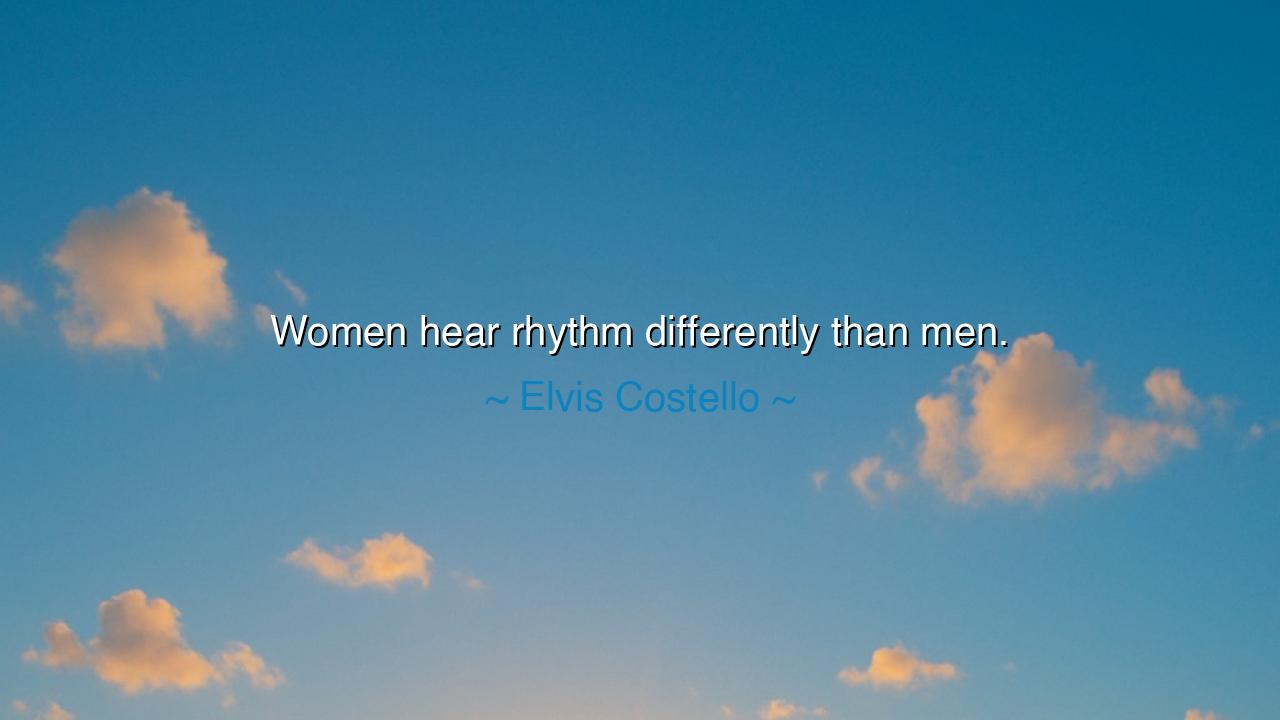
Women hear rhythm differently than men.






The words of Elvis Costello, “Women hear rhythm differently than men,” carry more than the sound of music; they whisper of the mysteries of perception, of how the heart and soul of each being responds uniquely to the pulse of life. In them lies a recognition that rhythm is not merely a pattern of beats, but the language of the body and spirit—and that women, shaped by experience and intuition, may feel its currents with a depth distinct from men.
The origin of such insight rests in the timeless truth that music is more than sound—it is connection, emotion, and movement. From the earliest drums around the fire, rhythm has guided labor, celebration, and ritual. Yet each listener hears through the filter of their own life. Women, often attuned to cycles of nature, to the subtle motions of nurture and endurance, may experience rhythm as something more fluid, relational, and embodied, while men may often perceive it as structure, pattern, and command. Neither is lesser—both reveal the many ways the human soul communes with harmony.
Consider the story of the West African griots, keepers of history and song. In their traditions, the women would often lead in song, their voices weaving through the steady drumming of the men. The drummers gave pulse, but the women gave shape, bending the rhythm into story, into emotion, into prophecy. Here, indeed, women heard rhythm differently, transforming a beat into a living tale. Their way of listening made the music not only something to march to, but something to feel, to remember, to live by.
Costello’s words are also a parable about difference itself. Too often, societies have demanded sameness, as if the way of men must also be the way of women. But in music, as in life, difference is richness. To hear differently is not to hear wrongly; it is to widen the spectrum of beauty. The union of distinct perceptions is what gives harmony its depth and power.
The lesson is this: honor the different ways of hearing the world. The rhythm of life is vast, and no single ear can grasp its fullness. When men and women listen together—each in their own way—the music becomes complete, layered with strength, tenderness, and mystery.
Let the generations remember: difference in perception is not division but completion. The song of life requires many listeners, many voices, many ways of hearing. And in this great symphony, the way women hear rhythm adds a depth that no other ear can give, a reminder that harmony is born not in sameness, but in unity of the diverse.






PAPhuong Anh
I find it intriguing that Elvis Costello suggests women hear rhythm differently. If this is true, how does this impact the way women create and experience music compared to men? Does it affect the types of music they’re drawn to or how they express themselves musically? How much of this difference is based on actual biology versus the roles women are encouraged to take in music and rhythm throughout history?
VAVan Anh
Elvis Costello's idea of women hearing rhythm differently is thought-provoking, but it brings up the question: Is there any scientific evidence to support this claim? Are there cognitive differences between men and women when it comes to perceiving music? Or could it just be a matter of cultural exposure and musical upbringing? I’m interested in how much of our perception of music is shaped by gender and how much is shaped by personal experience.
TNTuyet Nhu
Costello’s statement about women and men hearing rhythm differently is an interesting observation, but I wonder if it oversimplifies the issue. Is it possible that women and men simply have different musical tastes or preferences rather than a fundamental difference in how they hear rhythm? Could this quote reflect broader cultural assumptions about gender and how women and men are expected to engage with music?
DHDuc Hoang
Elvis Costello’s statement seems to imply that there’s an inherent difference in how men and women experience rhythm. While there may be some truth in how we process and interpret sound, it’s important to remember that musical perception is also influenced by personal experiences and cultural background. How much of the rhythm we hear is determined by our individual life experiences, regardless of gender?
TNTantai Nguyen
I’m curious about what Elvis Costello means by ‘hearing rhythm differently.’ Could it be a metaphor for how men and women might approach or interpret music in different ways? If so, is this difference based on biological factors, or is it more about the way each gender is socialized to engage with the world? How do these perceptions affect the music industry and its approach to gender and sound?